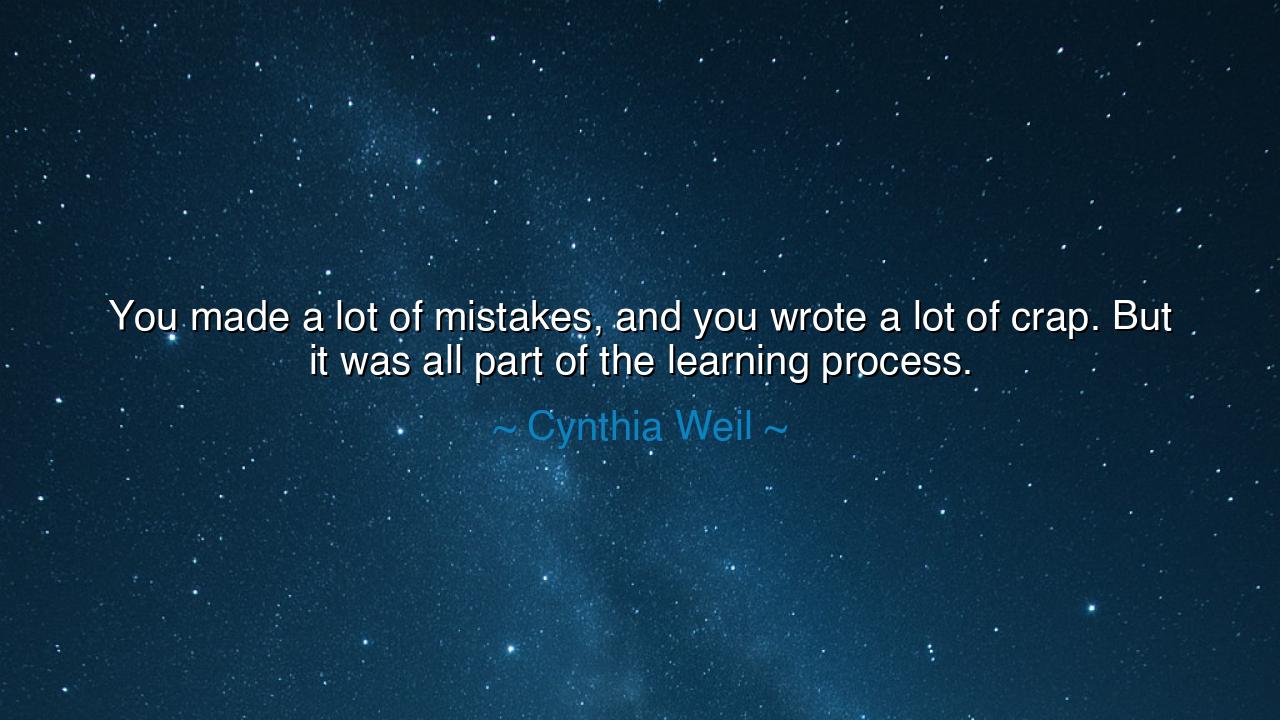
You made a lot of mistakes, and you wrote a lot of crap. But it
You made a lot of mistakes, and you wrote a lot of crap. But it was all part of the learning process.






Hear now the words of Cynthia Weil, master of song and storyteller of the human heart, who declared: “You made a lot of mistakes, and you wrote a lot of crap. But it was all part of the learning process.” At first, her words seem harsh, almost dismissive of failure. Yet hidden in this blunt confession lies a truth as ancient as wisdom itself: that greatness is never born without error, and that what seems worthless in the moment is often the very soil from which mastery grows.
She speaks first of mistakes, the stumbling stones that humble every creator, thinker, or dreamer. To err is not a mark of weakness, but a sign of striving, of daring to step where one’s feet are untrained. The ancients knew this well; for how could the potter shape the perfect vessel without first shattering clay upon the wheel? How could the poet find the eternal verse without first scribbling lines unworthy of song? The path to wisdom is paved with such fragments, and Weil calls us to embrace them, not as shame, but as necessary offerings to the gods of growth.
She also speaks of writing “a lot of crap”, with honesty that cuts like iron. This phrase, simple and unadorned, is the cry of all creators who have faced the blank page and filled it poorly, yet pressed on. It is the courage to admit imperfection, to endure mediocrity, and to keep creating even when the product feels unworthy. For in the act of persistence, the mind is sharpened, the craft refined, the soul prepared for the works that endure. Without the “crap,” there would be no masterpieces. Without the false notes, there would be no symphonies.
Consider the life of Thomas Edison, who, when inventing the light bulb, failed thousands of times before success. To the impatient, these failures seemed endless and foolish. Yet Edison himself declared that he had not failed, but discovered thousands of ways that would not work. Each failure was not waste but step, part of the learning process, exactly as Weil describes. In his persistence, the light of modern civilization was born, and his story reminds us that what seems futile may be sacred preparation.
The emotional power of Weil’s teaching lies in its humility. She does not glorify perfection, nor does she soften the pain of failure. She accepts both the ugliness of early efforts and the beauty of what they become. Her words remind us that the learning process is not clean or glorious, but messy, flawed, and often humiliating. Yet those who endure through the mire emerge with wisdom, skill, and strength that no easy path could provide.
The lesson, O listener, is this: do not despise your failures. Do not curse the works you deem poor, for they are the stepping stones toward mastery. The errors, the drafts, the false starts—all are teachers in disguise, shaping your craft and your character. To strive without error is impossible; to stop because of error is tragic; but to continue in spite of error is the path of greatness.
What then shall you do? First, embrace mistakes as companions, not enemies. Record them, learn from them, and press onward. Second, create boldly, even if your work feels unworthy, for each act strengthens the hand and clears the path for better work to come. Third, encourage others in their failures, reminding them, as Weil reminds us, that even what seems worthless has purpose in the grand design of growth.
And remember always: the learning process is long, arduous, and filled with imperfections. Yet within it lies the seed of all greatness. Cynthia Weil’s words are both confession and comfort, telling us that even the masters once stumbled, even the finest voices once faltered. Take courage, therefore, and continue, for your mistakes are not chains but stepping stones toward the heights you are destined to reach.






AAdministratorAdministrator
Welcome, honored guests. Please leave a comment, we will respond soon